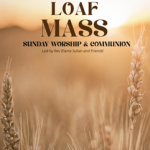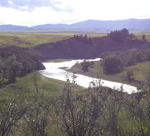Introduction to Loaf Mass (by Wendy Pope)
The first day of August is a special time on the wheel of the year, cross-quarter, falling halfway between the summer solstice and the autumn equinox. This is Lammas, also known as Lughnasadh marks the beginning of the Harvest Season in the Celtic tradition. The name “Lammas” comes from “loaf mass,” referring to the tradition of bringing the first loaves of the harvest to church for to be blessed. The farmers of Old would bring in the very first sheaves of grain, thresh it and grind it to make into bread. These first Loaves would then be brought to the Church, blessed and shared in Holy Communion.
Today we celebrate this moment on the Wheel of the year as it is experienced in our Island Community.
Over the last few years The Growers and Producers Association has been experimenting with small scale wheat and barley production as well as beans, flint corn and more. The group has acquired equipment for threshing and planting.
This year there are several acres of barley, plus buckwheat, flint corn at Woven Grove and the Snag for grinding, Doug Wright is experimenting with wheat finding it way dry this year for it. He, Noah and others will be planting winter wheat this fall for harvest in the late spring. And this is just a sample of the Grain Growing efforts.
Growers and producers will be hosting a grain cleaning day Sept 26 Date to be confirmed. Community is welcome to come check it out.
Our farmers and growers are increasing our local food security and quality, while creating right livelihood for themselves and others. We’re blessed to have so many growers of diverse foods on Denman. Many thanks to all our local food producers.
Rev Elaine Julian’s service: The Good News: Luke 12:13-21 Common English Bible
13 Someone from the crowd said to him, “Teacher, tell my brother to divide the inheritance with me.”
14 Jesus said to him, “Man, who appointed me as judge or referee between you and your brother?”
15 Then Jesus said to them, “Watch out! Guard yourself against all kinds of greed. After all, one’s life isn’t determined by one’s possessions, even when someone is very wealthy.” 16 Then he told them a parable: “A certain rich man’s land produced a bountiful crop. 17 He said to himself, What will I do? Ihave no place to store my harvest! 18 Then he thought, Here’s what I’ll do. I’ll tear down my barns and build bigger ones. That’s where I’ll store all my grain and goods. 19 I’ll say to myself, You have stored up plenty of goods, enough for several years. Take it easy! Eat, drink, and enjoy yourself. 20 But God said to him, ‘Fool, tonight you will die. Now who will get the things you have prepared for yourself?’ 21 This is the way it will be for those who hoard things for themselves and aren’t rich toward God.”
Reflection: “The Bread We Need”
Bread and the grain that it’s made from is both a daily necessity and a deep, deep cultural symbol. In the Christian tradition, our need for daily bread is the central petition in the prayer that Jesus taught us: “Give us this day the bread we need.” Bread is also one of two central symbols in our celebration of Holy Communion – Jesus Christ, the bread of life.
Today’s reading from the gospel of Luke centres on a story about a bumper harvest of the grain that is needed to make bread, the staple food of the people. Jesus is answering a man who asks him to arbitrate in his request for his share of his inheritance. Jesus declines to act as judge, but instead offers a story prefaced with a warning to guard against all kinds of greed.
A rich man is blessed with a crop so big that he has nowhere to store it. Jesus emphasizes that this man has done nothing to earn this bounty. “The land of a rich man produced abundantly.” He decides to build bigger and better storehouses, and sit back to enjoy his wealth. This man is completely focussed on his own greed and his own pleasure. But before he can even start to enjoy this rosy future, he dies.
In Jesus’ time, landowners became rich when smaller farmers couldn’t pay their debts and turned over their land as repayment. A rich man’s profits were the direct result of the poverty of his neighbours. To counteract this, the ancient Hebrews had a tradition of redistribution of land and wealth through regular years of Jubilee, when debts were forgiven and land returned. But this rich man is only interested in accumulating for himself. One of my favourite theologians, Ched Myers, says that the greed here is a predatory force, not just a moral failing. Ched calls it “the sin of taking too much”.
I want to share a quote with you that has stuck with me for a long time. It’s from Fred Eaglesmith, a Canadian alternative country musician who would probably be quite surprised to be quoted in a minister’s reflection. At the Filberg Festival quite a few years ago, he said “Enough is enough. You can’t have more enough.” It sounds simple, but it really isn’t.
The rich landowner didn’t understand this. He clearly had enough to meet his own needs. But he ignored the needs of his neighbours and tenant farmers, and he ignored the generosity of Creator and the land. He accumulated only for the sake of having more. And he forgot all about the great lesson of mortality: you can’t take it with you!
How do we hear this story today? How do we hear it in our own lives and the life of the world? Who are the rich fools?
I’m pretty sure we can all picture an individual or a country or a culture that we are comfortable naming in this way. Clearly, unbridled greed, predatory greed, is wreaking havoc throughout the world. Greed is so pervasive that it’s beginning to be seen as more of a virtue than a vice. The accumulation of more and more wealth and power is paramount, and the cost to others just doesn’t matter.
But on a more personal level, if we have been taught to be careful with money, to “save for a rainy day”, this story can sound quite judgmental. What’s wrong with putting something away for the future? There are lots of stories in scripture where we are counselled not to squander everything immediately, to look ahead to what will be needed when the crops aren’t as good.
So let’s talk about what is being judged and what is not being judged.
Jesus is not judging the rich man for storing more than he can use right away. He is judging him for his backwards priorities. He is judging him for putting himself first, and for forgetting his obligations to God and to his neighbours. Death in this story is not the judgment of an angry God, but simply a reminder of the inevitable. No matter how much power and wealth we have, we all die. For this unfortunate man, the unavoidable came much sooner than expected.
God also does not judge us for our good fortune, or for being careful with our resources. I invite you to hear this as a message of reminders and invitations, not judgment.
We are reminded that “enough is enough. You can’t have more enough.”
We are reminded that our bread comes from the land and from Creator. We are invited to share what is given to us with those who don’t have enough. We are reminded that in the economy of Creation, there is enough for everybody but not enough for selfishness and misuse. If we keep more than enough for ourselves, someone else will go without. If we take too much from the land, the land will stop producing.
Ched Myers says, “The “Great Economy” of nature precedes us and will survive us. Private accumulation is thus a desperate, but ultimately short-term, hedge against the inevitable economic redistribution that comes with mortality. Conversely, the divine Commonwealth is the only thing that endures, and thus the only “treasure” of actual value. This negative object lesson suggests that ownership paradigms must be shifted from “mine” to “ours.” “
We are invited to give thanks to Creator and thanks to the land for all that they provide for us. We are invited to share with our neighbour, and our neighbour is anyone in need whether next door or on the other side of the world.
We are invited to live into the abundance of today, knowing that we won’t be here forever. We are invited to think carefully about what we need, what we want, and why we want it.
We are invited to be “rich towards God”. This passage doesn’t tell us exactly what that means, but there are many other stories in the gospel of Luke that do. For Luke’s Jesus, it means using our resources for the good of others, intentionally listening to the Spirit, selling possessions to give to the poor, and trusting that God will provide what we need.
The grain grows and is harvested. Bread is baked. We give thanks to Creator, we remember Jesus as the bread of life, we bless and share the bread and rejoice in God’s abundant economy.
Thanks be to God. Amen.





